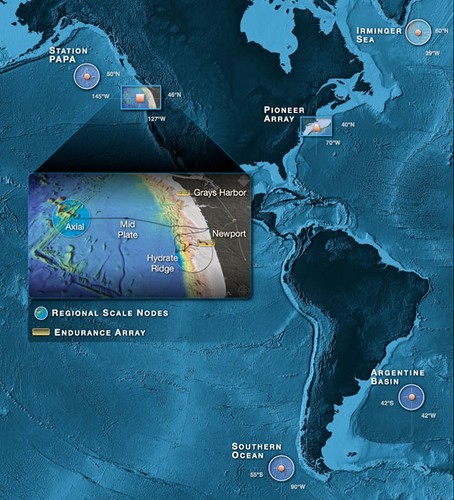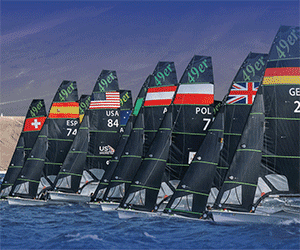WHOI will lead Coastal and Global Observatories effort
by Woods Hole Oceanographic Institution on 13 Sep 2009

Funded by the National Science Foundation and overseen by the Consortium for Ocean Leadership, the Ocean Observatories Initiative’s goal is to install transformational technology in ocean observatories where it can serve researchers, policymakers and the public. The project includes global, regional, and coastal observing arrays enabled by a dedicated cyberinfrastructure. (Center for Environmental Visualization, University of Washington) Woods Hole Oceanographic Institution (WHOI)
http://www.whoi.edu/
-202405030836.gif)

The coastal and global arrays are part of the larger Ocean Observatories Initiative (OOI). Funded by NSF and managed by OL, the visionary infrastructure project establishes a network of global, regional, and coastal observatories, linked by a system-wide cyberinfrastructure, to actively observe complex ocean processes such as climate variability, ocean circulation, and ocean acidification across a range of spatial scales at critical coastal, open-ocean, and seafloor locations.
'Woods Hole Oceanographic Institution is delighted to be a part of this transformational and unprecedented endeavor. We are committed to building and maintaining the OOI infrastructure for the ocean science community,' said WHOI President and Director Susan K. Avery. 'With an interactive connection to the ocean and near real-time access to data from hundreds of sensors at key locations around the globe, we believe this project will lead to major advances in our understanding of essential Earth processes, such as the global carbon cycle, and help us address global scientific and societal issues including climate change, changing ocean chemistry, and the health of our oceans and marine ecosystems.'
A 2007 award established WHOI and its partners, Scripps Institution of Oceanography at UC San Diego and Oregon State University, as the implementing organization for the coastal and global components of the OOI network. Each partner will contribute scientific and engineering expertise to the development of an innovative approach using moored buoys and autonomous vehicles that will provide users with data in real-time or near-real-time and allow users to remotely control their instruments and construct virtual observatories specifically tailored to their scientific needs. Off Oregon some of the moored buoys will connect to the cable of the Regional Scale network being implemented by the University of Washington. Corporate partner Raytheon will provide project management and systems engineering support.
'Bringing together three of the premier, sea-going oceanographic research and education institutions in the U.S. has allowed WHOI to forge a team with the expertise and the personnel needed to design, build, and maintain innovative new observing platforms for community use,' said Robert Weller, a WHOI physical oceanographer and leader on the project. 'NSF has made a remarkable commitment to ocean sciences not only by funding the design but also by planning for a 25-30 year operation of the coastal arrays on both the east and west coasts, while maintaining four high latitude, deep ocean arrays, two in the northern hemisphere and two in the southern hemisphere.'
WHOI and Scripps will design and deploy global moorings to investigate multidisciplinary regional processes and the role of the ocean at critical high latitude locations. A major goal of the global observatory is to better understand and predict the impact of climate change on the interlinked ocean-atmosphere system and on marine ecosystems, biodiversity, and community structure, especially in remote, poorly sampled parts of the world’s ocean.
WHOI will work with OSU to prepare and deploy the coastal 'Endurance Array,' two lines of moorings off Oregon and Washington; and WHOI will tackle the 'Pioneer Array' in the Mid-Atlantic Bight. The aim of the coastal arrays is to understand complex coastal ecosystems and their critical role in the ecology and biogeochemistry of the world’s oceans, coastal hazards such as storms and harmful algal blooms, and the impact of climate change on the coastal ocean.
The newly signed Cooperative Agreement comes at the end of a design and management review process and initiates the flow of funding to begin construction. The five-year construction phase will begin in September, with nearly $18 million of first-year funds for the coastal and global observatories coming from the American Recovery and Reinvestment Act of 2009. The expected budget requests for construction of the coastal and global nodes of the OOI in FY 2010 and beyond total approximately $101 million.
'This long-awaited investment will help us better understand the science of the ocean. It will allow us to monitor complex oceanic phenomena such as red tide, track our changing climate, preserve and protect our important ecosystems and maintain the health of the region’s vital fishing grounds,' said U.S. Senator John Kerry. 'My colleagues and I have been pushing for this funding for years – it’s refreshing to finally have an administration that understands and appreciates the positive impact science can have on our economy and our environment.'
The Commonwealth of Massachusetts has provided matching funds through the Massachusetts Technology Collaborative (MTC) John Adams Innovation Institute (JAII) to enhance ocean-observing capabilities at the 'Pioneer array' on the New England Shelf.
'Massachusetts sets national standards in marine science, technology and innovation and these new observatories represent an essential opportunity to focus our collective strengths,' said Massachusetts Secretary for Housing and Economic Development Greg Bialecki. 'This federal funding is critically important in advancing our global leadership in academia and the knowledge-based economy.'
Massachusetts Secretary Energy and Environmental Affairs Ian Bowles agreed. 'Massachusetts has long been a leader in ocean research, and Woods Hole Oceanographic Institution a leader among leaders,' said Bowles. 'And in launching the nation’s first comprehensive ocean management process for state waters, Massachusetts has much to gain from new ocean science. I congratulate WHOI, and I could not be more pleased to see this ocean observing system get underway with their vital participation.'
The expected benefits to Massachusetts and New England include:
• Better scientific information for public coastal managers to manage ocean resources and commercial fisheries, predict harmful algal blooms ('red-tide'), and mitigate the hazards from oil spills or coastal storm inundation;
• Improved assessments of the impact of longer-term climate change on the region;
• More accurate weather forecasts and storm prediction;
• Increased ability to balance and preserve coastal environmental resources, protecting recreational areas
• Enhanced academic-industry partnerships that will stimulate the development of new data products and advanced technologies in the Marine Science & Technology cluster (e.g., autonomous robotic underwater vehicles, sensors, self-powered moorings, underwater communication and anti-fouling technologies).
'This is not just another big step for the Woods Hole Oceanographic Institution, it is a huge leap forward in bringing the information revolution to the sea,' said U.S. Representative William Delahunt. 'The funds will boost our understanding of the ocean and climate change, while providing valuable tools to help us manage exciting new uses of the sea, such as offshore wind, wave and tidal energy.'
'The ocean is our last great frontier, and holds the answers to a myriad of questions about our planet. Giving world-renowned organizations like WHOI the tools necessary to collect the data will allow for a new age of discovery,' said Massachusetts Senate President Therese Murray. 'The fact that with this construction, we will be one step closer to collecting this important data is very exciting.'
If you want to link to this article then please use this URL: www.sail-world.com/61221